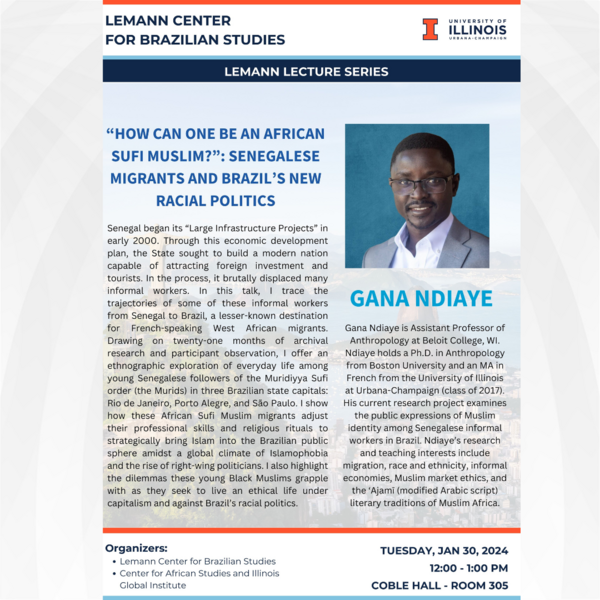
“How Can One Be an African Sufi Muslim?”: Senegalese Migrants and Brazil’s New Racial Politics
- Event Type
- Lecture
- Sponsor
- Center for African Studies, The Lemann Center for Brazilian Studies, and Illinois Global Institute
- Location
- Coble Hall, Room 305
- Date
- Jan 30, 2024 12:00 - 1:00 pm
- Speaker
- Gana Ndiaye is an Assistant Professor of Anthropology at Beloit College, WI. Ndiaye holds a Ph.D. in Anthropology from Boston University and an MA in French from the University of Illinois at Urbana-Champaign (class of 2017). His current research project examines the public expressions of Muslim identity among Senegalese informal workers in Brazil. Ndiaye’s research and teaching interests include migration, race and ethnicity, informal economies, Muslim market ethics, and the ‘Ajamī (modified Arabic script) literary traditions of Muslim Africa.
- Contact
- Lemann Center
- lemann@illinois.edu
- Views
- 131
Senegal began its “Large Infrastructure Projects” in early 2000. Through this economic development plan, the State sought to build a modern nation capable of attracting foreign investment and tourists. In the process, it brutally displaced many informal workers. In this talk, I trace the trajectories of some of these informal workers from Senegal to Brazil, a lesser-known destination for French-speaking West African migrants. Drawing on twenty-one months of archival research and participant observation, I offer an ethnographic exploration of everyday life among young Senegalese followers of the Muridiyya Sufi order (the Murids) in three Brazilian state capitals: Rio de Janeiro, Porto Alegre, and São Paulo. I show how these African Sufi Muslim migrants adjust their professional skills and religious rituals to strategically bring Islam into the Brazilian public sphere amidst a global climate of Islamophobia and the rise of right-wing politicians. I also highlight the dilemmas these young Black Muslims grapple with as they seek to live an ethical life under capitalism and against Brazil’s racial politics.